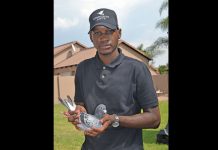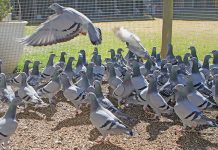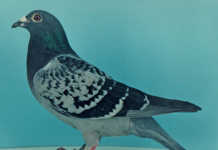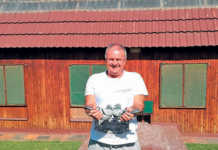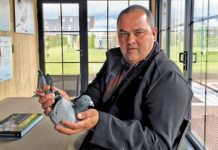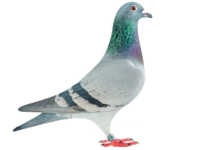Previously we covered pigeon parasites and malaria, as well as general hygiene, based on a lecture on the prevention and treatment of pigeon diseases presented by Dr Ockert Botha, world-renowned avian vet and technical director of Aviomed. Aviomed is a supplier of cost-effective avian health supplements and medicines aimed at boosting the pigeons’ natural immunity, while treating their ills.
Recap on malaria
Before going on to discuss candidiasis, Ockert’s comments about pigeon malaria bear repeating. This is a serious disease and once a racing pigeon contracts it, it remains in the bird’s system for life. Treatment, then, is aimed at preventing flare-ups and involves doses of Primaquin at 2ml/â„“ for 10 consecutive days. Flare-ups are especially prevalent when stress levels are high. Primaquin also has a booster effect on the performance of a well-trained and healthy race team. As for prevention, getting rid of pigeon flies and mosquitoes, which are the main vectors of the disease, is key.
Candidiasis
Another disease that affects pigeons is candidiasis, caused by the Candida albicans yeast. In the past, candidiasis was only seen as an opportunistic infection, but the latest research shows the course and effect of this disease have changed, says Ockert. While any pigeon may have candida in a mild form, the organism has become more virulent and can cause primary infections, especially when stress is high.
Candida infects and inflames the crop lining, hindering the absorption and digestion of food. Ockert warns that if your pigeon still has a filled crop in the morning, due to undigested feed from the previous afternoon, it’s likely it has candidiasis. Loss of appetite and struggling to swallow are other symptoms.
Treatment and prevention
Ockert suggests treating the virulent form of candidiasis with Nystatin. Add the recommended dose of Nystatin to 5g of Avio-Gel powder and mix into 2kg pigeon feed. This inhibits the growth of candida and bad bacteria and acts as an antioxidant.
In addition, says Ockert, “use glass water bowls as drinkers for the pigeons and not plastic ones, as candida survives in these. Cleaning out water bowls properly is always a good practice, but avoid strong disinfectants, because prolonged use kills the good bacteria in the pigeon’s crop”.
Finally, remember to keep general loft hygiene in mind – avoid wet loft floors, cold draughts and stale air.
Minimise stress levels by keeping fewer pigeons. And remember – happy pigeons are healthy pigeons.

